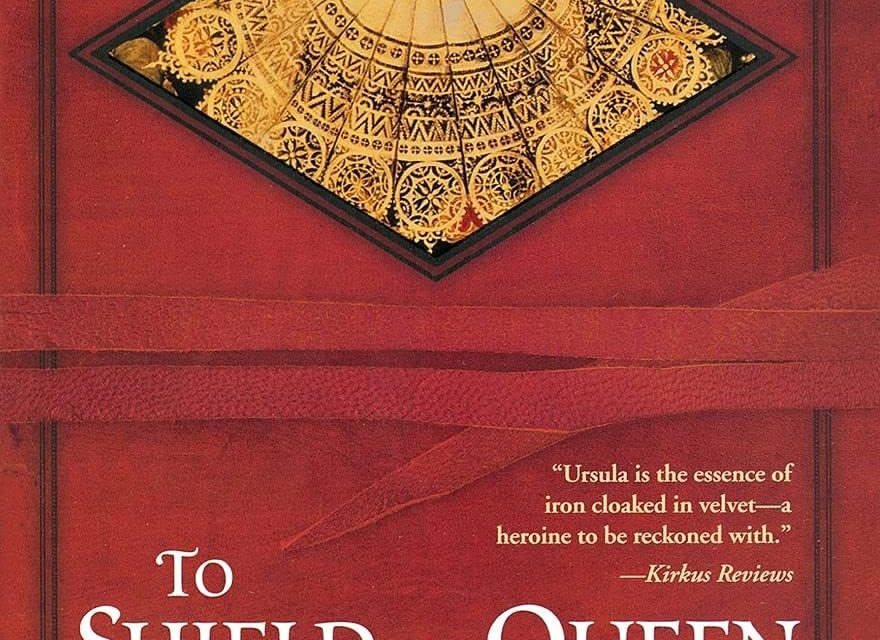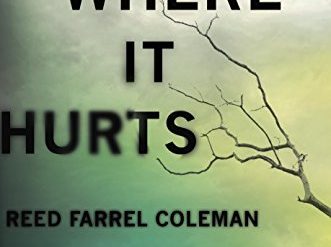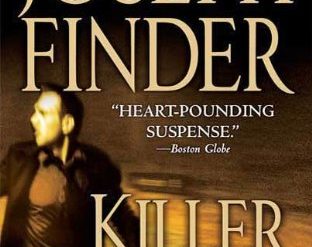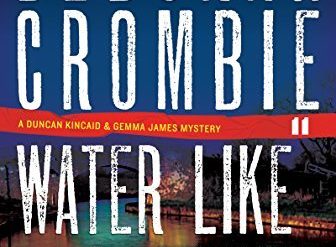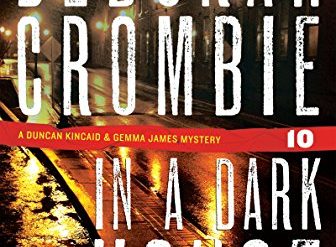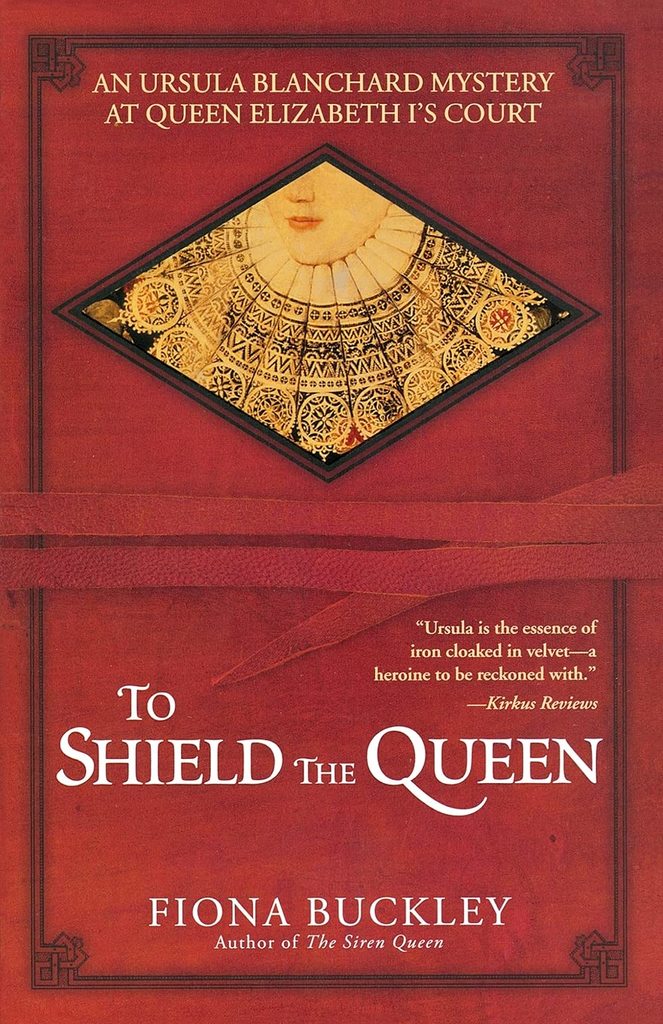
Her story is well known. The reign of Elizabeth I (1533-1603) marked the emergence of England onto the world stage. During the forty-five years of her reign, Elizabeth’s fleet defeated the world’s most powerful navy (albeit by lucky chance) and kept the predatory powers of the Continent at bay through adroit diplomacy and innovative spycraft. This brilliant daughter of Henry VIII and Anne Boleyn remained unmarried and childless throughout her life. Despite intense pressures to take a royal husband and produce an heir, she remained in command of a court teeming with ambitious and often unscrupulous men. Yet when she left the scene in 1603, the throne passed to the son of her worst enemy, Mary Stuart, formerly Queen of Scots. Elizabeth was the last of England’s rulers from the House of Tudor.
This post was updated on October 26, 2022.
Given the drama of the Elizabethan Era, and the prominence of its playwrights and poets, including William Shakespeare and Christopher Marlowe, it’s no surprise that mystery novelists have turned eagerly to the period to set their stories. There are at least half a dozen series of Elizabethan mystery or spy novels. They reflect the history of the period with varying degrees of fidelity. To date, I’ve read half a dozen of the books, dipping into six of those series. They’re all listed below, with capsule descriptions and links to my reviews. (They appear in alphabetical order of the authors’ last names within each of the two categories.)
Top-rated mysteries set in Elizabethan England
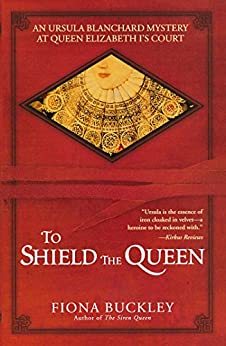
To Shield the Queen (Ursula Blanchard #1) by Fiona Buckley (1997) 288 pages ★★★★☆—A worthy murder mystery set in the court of Queen Elizabeth I
Nearly a quarter-century ago, an English technical journalist and industrial editor named Valerie Anand (1937-) sat down to write a series of mystery novels set in the court of Queen Elizabeth I. To Shield the Queen, published in 1997 under the pen name Fiona Buckley, was the first of what to date is a series of eighteen books. It’s a worthy introduction to the long-running series and a great read for anyone enamored of historical mysteries. Anand’s protagonist, Lady-in-Waiting Ursula Blanchard, has the stuff to sustain readers’ interest through thick and thin. And there is no lack of intrigue in Queen Elizabeth’s court. Read the review.
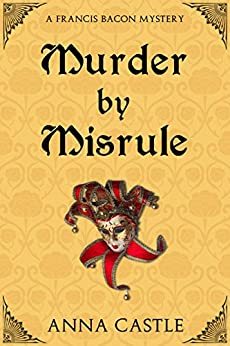
Murder by Misrule (Francis Bacon Mystery #1) by Anna Castle (2014) 350 pages ★★★★☆—A lawyer is murdered in the Elizabethan Age
The year is 1586, the Spanish Armada two years in the future. A brilliant young English lawyer named Francis Bacon is headed for glory and high office. He was the youngest man yet to have been admitted to the bar and still is only twenty-five. Yet his impulsive nature has landed him in disrepute with the Queen, who has banished him from the Royal Court. Only when his powerful uncle assigns him to investigate the murder of a fellow barrister at Gray’s Inn does Bacon see a way back into the Queen’s good graces. Thus, with customary drive and efficiency, he enlists the law students he is tutoring and sets out on an investigation that will expose the tragic fault lines in English society. Welcome to Murder by Misrule, the first in a series of six Francis Bacon mysteries. Read the review.
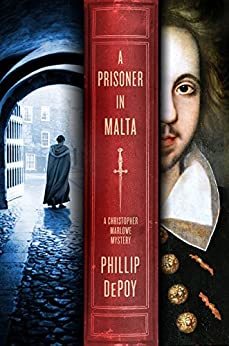
A Prisoner in Malta (Christopher Marlowe #1) by Phillip DePoy (2016) 321 pages ★★★★☆—A delightful historical mystery novel starring Christopher Marlowe
In this fast-moving historical mystery novel featuring Christopher Marlowe, the 19-year-old poet and playwright swashes buckles with the best of them. Naturally, he comes out on top (since this is, after all, the first book in a series). But Kit Marlowe isn’t the only character seized from the pages of history. The book is crammed with historical figures, including the man to whom the term “spymaster” was first applied: Sir Francis Walsingham. Walsingham was Queen Elizabeth I‘s Principal Secretary and her last line of defense against the many Catholic conspirators who’d set out to kill her. And, yes, you guessed it: Walsingham drafts Marlowe into the action to foil the most ambitious of those plots. This may be the best of these mysteries set in Elizabethan England. Read the review.
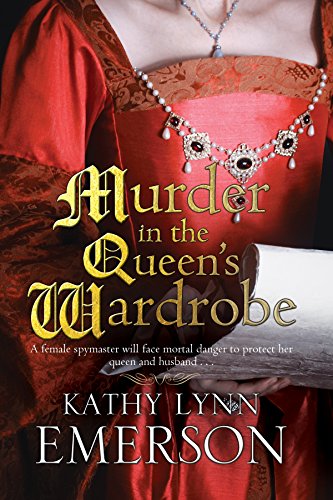
Murder in the Queen’s Wardrobe (Mistress Jaffrey #1) by Kathy Lynn Emerson (2015) 271 pages ★★★★☆—Intrigue and murder in Elizabeth’s court
The novel introduces Mistress Rosamond Jaffrey, the subject of Emerson’s three-book series of spy novels set late in the Elizabethan era. Jaffrey is the illegitimate but beloved daughter of a wealthy knight whose fortune she inherited. Also, “she’d been given a remarkable education, equal to that received by any gentleman’s male heir.” Now independently rich, she owns a large and comfortable London house and other property. Her husband, Rob Jaffrey, is now seeking his fortune in Moscow. The two are estranged. She does not expect them to reunite, but they remain friends.
Life seems good to her. Which makes her reluctant to agree to an appeal from Master Nicholas Baldwin, a family friend throughout her life. He is “a merchant wealthy enough to own manors in both Northamptonshire and Kent.” Unaccountably, he wants her to work undercover as a spy in the household of young Lady Mary Hastings. But he will not tell her on whose behalf she would be working, or why. Read the review.
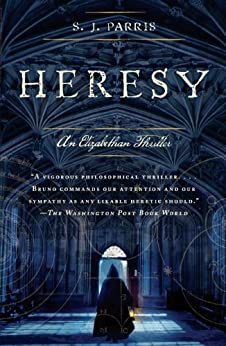
Heresy (Giordano Bruno #1) by S. J. Parris (2010) 448 pages ★★★★☆—An historical spy thriller in the Elizabethan Age
Britain during the reign of Elizabeth I (1533-1603) was wracked by turmoil and intrigue rooted in doctrinal differences between the newly independent Church of England and the deeply entrenched forces of Catholicism. To root out the many conspiracies mounted by her foreign and domestic enemies, the Queen’s principal private secretary, Sir Francis Walsingham (1532-90) operated an extensive network of spies. And in S. J. Parris‘s engaging historical spy thriller, Heresy, Walsingham recruits the famed Italian philosopher and mathematician Giordano Bruno (1548-1600) to spy on the dons of Oxford University during the time he spent on the island as a fugitive from the Inquisition. Read the review.
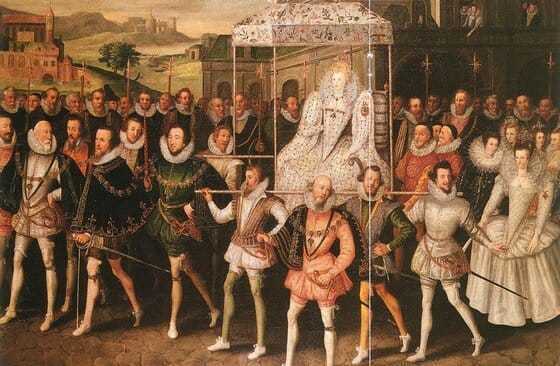
Less worthy mysteries set in Elizabethan England
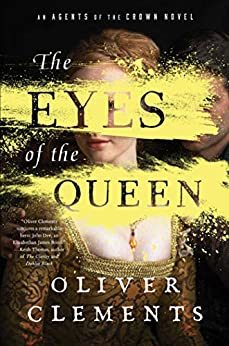
The Eyes of the Queen (Agents of the Crown #1) by Oliver Clements (2020) 303 pages ★★★☆☆—They’re trying to assassinate the queen!
The protagonist of this story, which Clements envisions as the debut of a new series of historical thrillers, is John Dee (1527-1608). Clements imagines him as a spy in the mold of James Bond. It’s true that much later in the reign of Queen Elizabeth I (1533-1603) he was one of her “Watchers.” (To Oliver Clements’ amusement, he even used the codename “007.”) And during England’s war with Spain (1585-1604) he reported on developments in the Spanish court, among his other duties.
However, at the time of the events in this novel (1572), Dee was merely the court astronomer and adviser to the queen. If there is any record of his having been involved in espionage with the queen’s spymaster, Francis Walsingham (1532-90), or in any scheme to infiltrate those who were trying to assassinate the queen at an earlier time, I’m unaware of it. In fact, Dee seems to have been entirely engrossed in astrology, alchemy, magic, the occult, and other delusions of the age. Read the review.
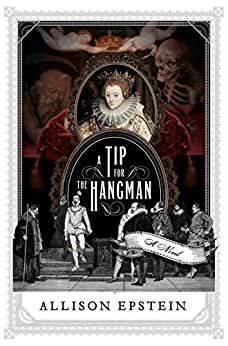
A Tip for the Hangman by Allison Epstein (2021) 374 pages ★★★☆☆—This historical spy story ignores history
When historical novelists depart from the recorded facts of history on occasion, it’s generally understandable. For example, in her excellent novel of the Wars of the Roses, The Kingmaker’s Daughter, Philippa Gregory glosses over the six-month interregnum in the reign of King Edward IV, and that matters little. But Allison Epstein wanders much too far from the facts in her historical spy story, A Tip for the Hangman. The novel is an alternate history of sorts, since many of the events central to the plot never happened. But alternate history serves to examine what might have taken place if some act or decision known to history had gone the other way. And there’s none of that in this story.
Although A Tip for the Hangman is well enough written—the style is pleasing—Epstein has built her novel around well-known events and personalities but scrambled the people and the timeline involved. Of all these mysteries set in Elizabethan England, this is the least satisfactory for its departure from the historical record. Read the review.
For related reading
For perspective on the period, see Bess of Hardwick: Empire Builderby Mary S. Lovell (She was the most powerful woman after the Queen).
You might also be interested in:
- Top 10 historical mysteries and thrillers
- Famous people as detectives in fact and fiction
- 20 top nonfiction books about history
And you can always find my most popular reviews, and the most recent ones, on the Home Page.

